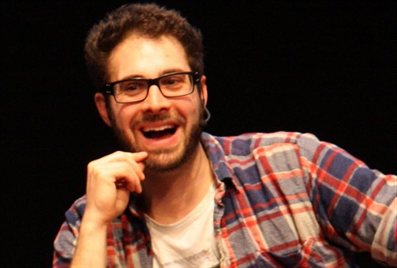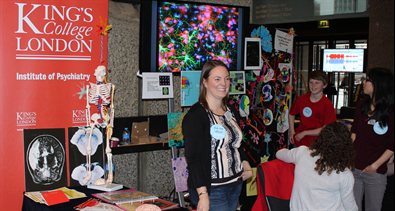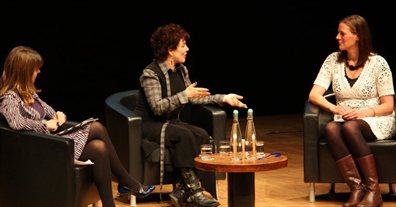IoP at Wonder Season: art & science of the brain
Staff and students from the Institute of Psychiatry (IoP) at King’s took part in a wide range of events for the Wellcome Trust Wonder Season last week at the Barbican, inspiring children and adults alike about the world of neuroscience.
Mark Horowitz (PhD student, Department of Psychological Medicine) won first prize in the final of ‘I’m at Neuroscientist, get me out of here!’, Dr Diane Hanger and Dr Teresa Rodriguez Martin (Department of Neuroscience) and their team of volunteers hosted a stand at the Wonder Street Fair, talking to thousands of people about the brain and dementia, Dr Tamara Russell led a crowd of 1,300 people in a five minute mindfulness exercise, and Dr Vaughan Bell joined a discussion on cinema and psychosis and donned 19th C dress to talk about science.
Mark Horowitz works in the Stress, Psychiatry and Immunology Lab at the IoP investigating the biological mechanism underlying the relationship between stress and depression. He won the ‘I’m a Neuroscientist’ Live Weekender Heat in March 2013 guaranteeing him a place in the final. In front of an audience of 200 people at the Barbican, Mark to compete against 4 other brain scientists and answer challenging questions from the audience.
Commenting on the experience, Mark said: “Being a part of the 'I'm a Neuroscientist, get me out of here' was a great experience. I met a bunch of interesting neuroscientists studying topics as varied as why certain songs get stuck in your head, to those using optogenetics to understand the organisation of animal brains.
“The questions from the audience were varied and revealed both a considerable knowledge and engagement with neuroscience as well as a desire for a better understanding. Given that I spend most of my waking life toiling in a room alone with cells it was really exciting to see the level of interest from the public.” Mark won a £200 prize which he donated to the Psychiatry Research Trust

Mark Horowitz (photo credit: Wellcome Trust)
Dr Diane Hanger and Dr Teresa Rodriguez Martin were awarded grants from the Wellcome Trust and the King's Public Engagement Small Grants Scheme to host a stand at the Wonder Street Fair. Their stall ‘Forget-me-not: Amazing brain cell connections’ invited children and adults to pick up pipe cleaners, jigsaw pieces and plasticine to build their own neurons and brains and find out what happens when memories fail, and how researchers are trying to understand diseases such as dementia.
The stall attracted over 2,000 people over 3 days, and with the help of an enthusiastic team of 28 volunteers answered questions ranging from “is dementia hereditary?”, “how can I get into neuroscience research?” and “can dementia be cured?”.
“The idea was to get children involved in activities relevant to the brain and also to attract adults to the stall,” said Dr Hanger, “the aim was to engage the adults in conversations about dementia and neurodegenerative disease, provide information about research and help to reduce the stigma that is often associated with these increasingly common disorders. Three long and exhausting but very rewarding days…So would we do it again? Several volunteers have already asked when the next event is, so the answer has to be yes!”

Dr Claire Troakes, Brain Bank Coordinator at the Institute of Psychiatry at King's volunteered at the 'Amazing brain cells' stall
Dr Tamara Russell took part in a discussion with Ruby Wax and BBC Radio 4’s Claudia Hammond. After Ruby shared some of her experiences of mental ill health and the role of mindfulness in her recovery, Dr Russell guided the 1,300 strong audience in a five minute mindfulness exercise, followed by a discussion on the psychological mechanisms of mindfulness.
The discussion also drew on the current neuroimaging data detailing changes in the brain in regions related to attention and emotion regulation following mindfulness training.
“Many questions from the floor indicated a great deal if interest in the topic as a way to help individuals in a variety of settings including schools, older adults care homes, mental and physical health settings,” said Dr Russell.

From left to right: Claudia Hammond, Ruby Wax and Dr Tamara Russell (photo credit: Wellcome Trust)
Dr Vaughan Bell joined a panel of mental health professionals, film makers, people who had experienced psychosis and academics to discuss how film could help us better understand the experience of delusions and hallucinations.
“As film is an experiential medium it is perfectly placed to help communicate sometimes difficult to understand mental states and the event included discussion of mainstream films as well as films made by people who had personal experience of psychosis. My contribution was to look at how film-makers used narrative to involve the viewer in alternate realities and how this relates to our scientific knowledge of delusions and false beliefs.”
Finally, Dr Vaughan Bell was also involved in the Salon Project. Dressed in period costume, the event was an attempt to recreate the atmosphere of the 19th Century Paris salon where scientists and artists would discuss their latest ideas with interested members of the public.
Dr Bell said: “The audience and speakers were dressed in period costume but the science was completely up to date. I discussed the science of hallucinations and how each different types of hallucinatory experience reveal something of how the mind and brain function in us all.”
‘Wonder Season’ was part of the British Neuroscience Association (BNA) 2013 Festival of Neuroscience.
Photos courtesy of the Wellcome Trust